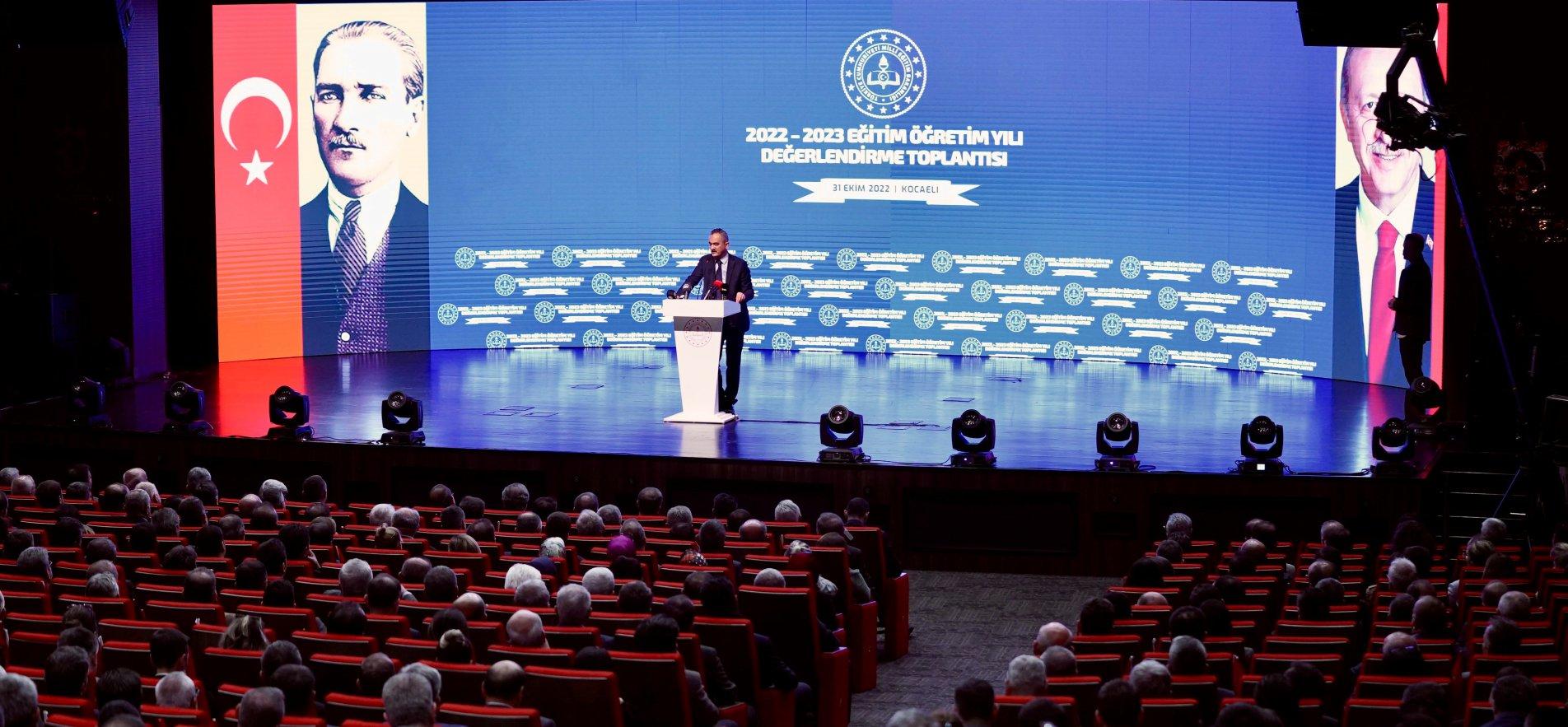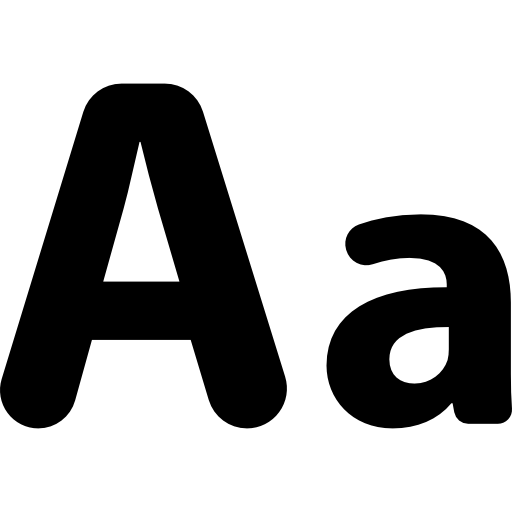Minister Özer stated that the Ministry of National Education has allocated additional 1 billion and 325 million liras to education investment budget of Kocaeli and increased city's education budget to 2 billion and 285 million liras in 2022 during his speech at the meeting organized in the Kocaeli Congress Center.
"Soon after the end of the last school year on June 17, we got together with more than 4 thousand school principals during meetings held in İstanbul and we shared views about education policies. 2023 will be the 100th anniversary of the foundation of the republic and we have decided to make a nice start to the new century of our republic," said Özer.
Reminding that they have been distributing free textbooks every year in order to reinforce equal opportunity in education in the last 19 years, Özer noted that the Ministry has distributed 153 million free text books and 160 million free supplementary sources to students at the beginning of the new school year in all 81 cities of the country.
Updated budget allocated to schools reached 5.5 billion liras
Özer stressed that they have hired 60 thousand cleaning workers a week before the beginning of the new school year adding that, "we have allocated 5.5 billion liras directly to each 57 thousand and 108 schools of our country for cleaning, minor repair and stationary needs. The Ministry of National Education, which takes the highest share of the budget in order to increase schooling levels to more than 90 percent, is capable of responding to the needs of schools."
Mentioning achievements made in education in the last twenty years, Özer said that education is the most important instrument for increasing the quality of human resources.
"Developed countries made giant investments in order to reach 100 percent in schooling rates after World War II. However, schooling rates in our country were very bad in the 2000s. Schooling rate of five year old children was 11 percent, schooling rate in secondary education was 44, schooling rate of female students was 39.2 percent and schooling rate in higher education was 14 percent. In the last 20 years, we have made education investments in every part of Türkiye without making any discrimination between regions and cities. As a result, the schooling rate of five year old children increased from 11 percent to 97 percent. Schooling rate in secondary education increased from 44 percent to 95 percent, schooling rate of female students increased from 39 percent to 94.66 percent," stated Özer.
Özer said that all antidemocratic practices in education such as the headscarf ban and coefficient practice were also lifted in the last twenty year.
"We have lifted such practices. We include the Quran, religious knowledge and the life of the Prophet as an elective course in the education program. We implemented many social policies in order to provide equal opportunity in education. Today, one and a half million students are having free meals at schools. We have a large education system with 19 million and 150 thousand students and 1.2 million teachers. In other words, there was no discrimination according to religion or gender in education," added Özer.
Reminding that Türkiye has been improving its grades in international student success surveys such as PISA and TIMSS every year in the last twenty years, Özer said that a recent OECD report revealed that Türkiye ranked first in the list of highest mathematics and science literacy grades despite it is also the country which witnessed highest increase in the number of 15 year old students.
Özer went on to say that, "Number of students per classroom reached its lowest rate of the 2000s. In the 2000s, it was 11 percent, 44 percent while student per teacher was around 40. Despite an increasing number of students, we achieved an OECD average in teacher per student figures. How did we do it? We have increased the number of teachers from 750 thousand to 1.2 million. 750 thousand teachers were appointed in the last 19 years. Hero of this process is President Recep Tayyip Erdoğan."
Özer stressed that they have prioritized three issues in education and the first of these priorities is the reinforcement of equal opportunity in education by carrying out preschool education campaigns.
"We have defined two areas. First was to increase the schooling rates in preschool education to the OECD average. Source of the inequalities in education is preschool education. When I was named as the Minister of National Education, there were 2,782 kindergartens in the country. We initiated a project with the support of Emine Erdoğan in order to inaugurate 3,000 kindergartens. Within a year, we inaugurated 2,050 kindergartens and 15,500 preschool classes. We have increased the schooling rate of three year old children which was 9 percent in August 2021 to 14 percent. Schooling rate of four year old children increased from 16 percent to 35 years and the schooling rate of five year old children increased from 65 percent to 97 percent. Preschool education improves cognitive, psychological, sociological and emotional skills of students and decreases crime rates. In other words, we are determined to raise healthy individuals of the Türkiye's century," said Özer.
Noting that the second step taken in order to reinforce education and equal opportunity in education was the projects carried out in order to reduce opportunity differences between schools, Minister Özer said that they have opened 16,361 libraries at schools within two months as a part of "No More Schools without Libraries" project. He stated that the number of books at school libraries increased from 28 million to 85 million and their goal is to increase this figure to 100 million.
Özer reminded that his Ministry successfully implemented 1000 Schools in Vocational Education and 10,000 Schools in Basic Education and they will initiate 10,000 Schools in Secondary Education Project in 2023.
"Our goal is to provide an equal school environment to each child regardless of the income level of their parents and their hometowns. In other words, maintain equal opportunity in education," said Özer. Concerning vocational education, Minister Özer noted that his Ministry has included the private sector in the education process and academically successful students started to enroll in vocational high schools.
Production capacity of vocational high schools was around 200 million liras in 2019 and it reached 1 billion and 162 million in 2021. Vocational high schools increased their production capacity during the Covid-19 pandemic and produced masks, disinfectants, disposal overalls and face guards, ventilators and mask machines. Later, vocational high schools were reinforced with R&D campaigns and innovative approaches. The Ministry inaugurated 55 R&D centers in vocational high schools and schools registered patents, useful models, brands and designs.
"Vocational High Schools annually registered 3 products in the last decade. After the opening of R&D centers, they made 8 thousand and 300 registrations. We have to equip our children with entrepreneurship skills in order to increase our competition capacity in the global market. Vocational high schools started to export their products," stated Özer.
Özer mentioned that they have amended the vocational education law as a part of their goal to improve vocational education. The amendment provides students the opportunity to get one third of minimum wage as a monthly salary and this salary is paid by the Ministry.
Özer went on to say that; "Within ten months, the number of apprentices and foremen in the entire country increased from 159 thousand to 930 thousand. Our goal is to enroll 1 million students as our President announced earlier. Employment rate of vocational education centers is 88 percent and 75 percent of students are hired by the workplace where they get trained."
Noting that the third priority of his Ministry is to support personal and professional development training programs for teachers, Özer said that they have adopted two approaches.
"Our first approach is to increase the capacity of professional and personal development training programs. We have initiated the school based professional development training programs for teachers. The second is the mobility program in order to display the best examples in the education system. Training program per teacher, which was 44 hours, increased to 194 hours in the first nine months of 2022 and exceeded OECD average," said Özer.
Budget allocated to training programs for teachers was 8.9 million liras in 2021 and it reached 292 million liras this year.
Career steps defined in the Teacher Profession Law lifted expert and head teacher quota and 95 percent of teachers who are qualified to expert and head teacher exams applied to attend training programs. Özer said that 99 percent of these teachers have completed their training programs and 98 percent of those who completed the program applied to the Ministry in order to enter the exam.
Özer mentioned some circles who called on teachers to protest the Teacher Profession Law and said that the Ministry has taken all kinds of measures in order to prevent any harm to students and continue education without any interruption. He stated that the Ministry will cut the allowances of teachers who attend the mentioned protest and they will also start a legal action against teachers who contact parents and ask them not to send their children to school.
"Career steps stipulated by the Teacher Profession Law are not obligatory. It is optional. The law is just a beginning and we will make amendments and additions to the new. We will make two improvements in the law. We can solve any problem related to the education system in cooperation with school administrators and teachers like we solved them in the past. We love to solve the problems of this country. We work in an effort to add beauty to the lives of our people. We will achieve many more successful projects in order to build Türkiye's Century," said Özer.





























